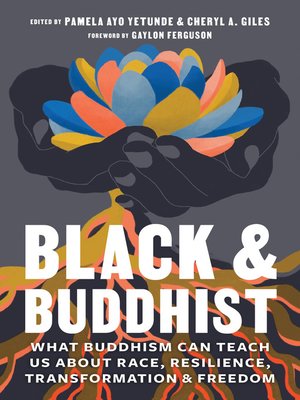Black and Buddhist
ebook ∣ What Buddhism Can Teach Us about Race, Resilience, Transformation, and Freedom
By Cheryl A. Giles

Sign up to save your library
With an OverDrive account, you can save your favorite libraries for at-a-glance information about availability. Find out more about OverDrive accounts.
Find this title in Libby, the library reading app by OverDrive.



Search for a digital library with this title
Title found at these libraries:
| Library Name | Distance |
|---|---|
| Loading... |
Gold Nautilus Book Award Winner
Leading African American Buddhist teachers offer lessons on racism, resilience, spiritual freedom, and the possibility of a truly representative American Buddhism. With contributions by Acharya Gaylon Ferguson, Cheryl A. Giles, Gyōzan Royce Andrew Johnson, Ruth King, Kamilah Majied, Lama Rod Owens, Lama Dawa Tarchin Phillips, Sebene Selassie, and Pamela Ayo Yetunde.
What does it mean to be Black and Buddhist? In this powerful collection of writings, African American teachers from all the major Buddhist traditions tell their stories of how race and Buddhist practice have intersected in their lives. The resulting explorations display not only the promise of Buddhist teachings to empower those facing racial discrimination but also the way that Black Buddhist voices are enriching the Dharma for all practitioners. As the first anthology comprised solely of writings by African-descended Buddhist practitioners, this book is an important contribution to the development of the Dharma in the West.
Leading African American Buddhist teachers offer lessons on racism, resilience, spiritual freedom, and the possibility of a truly representative American Buddhism. With contributions by Acharya Gaylon Ferguson, Cheryl A. Giles, Gyōzan Royce Andrew Johnson, Ruth King, Kamilah Majied, Lama Rod Owens, Lama Dawa Tarchin Phillips, Sebene Selassie, and Pamela Ayo Yetunde.
What does it mean to be Black and Buddhist? In this powerful collection of writings, African American teachers from all the major Buddhist traditions tell their stories of how race and Buddhist practice have intersected in their lives. The resulting explorations display not only the promise of Buddhist teachings to empower those facing racial discrimination but also the way that Black Buddhist voices are enriching the Dharma for all practitioners. As the first anthology comprised solely of writings by African-descended Buddhist practitioners, this book is an important contribution to the development of the Dharma in the West.







